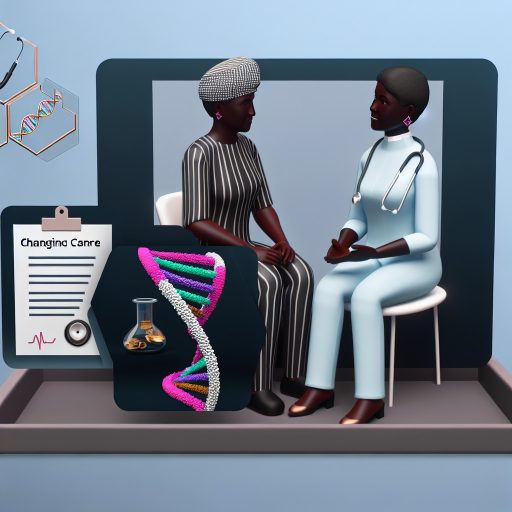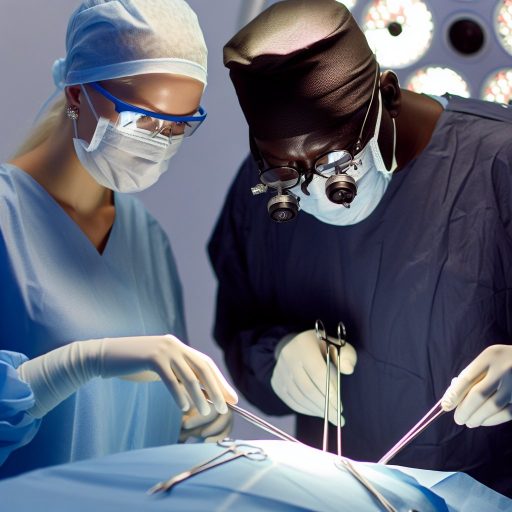Introduction:
Anatomical pathology involves the study of tissue and organs to diagnose diseases.
It is essential in healthcare for accurate diagnosis, prognosis, and treatment planning.
Nigeria is experiencing a growing need for well-trained anatomical pathologists.
Overview of Anatomical Pathology Residency Programs in Nigeria:
In Nigeria, a residency program is a structured training program for medical graduates to specialize in a particular field of medicine.
Anatomical Pathology residency programs focus on diagnosing diseases through the analysis of tissues and cells.
What Does a Residency Program Entail?
- Hands-on training in histopathology, cytopathology, and autopsy pathology.
- Supervised learning under experienced pathologists.
- Participation in research projects and case studies.
- Regular assessments and evaluations of medical knowledge and skills.
Duration and Structure of Residency Programs in Nigeria:
Anatomical Pathology residency programs in Nigeria typically last for a duration of 5 years.
During these years, residents rotate through various departments and gain experience in different aspects of pathology.
Accreditation Bodies for Anatomical Pathology Residency Programs in Nigeria:
- Medical and Dental Council of Nigeria (MDCN): The regulatory body overseeing medical education and training in Nigeria, including residency programs.
- West African College of Pathologists (WACP): Responsible for setting standards and ensuring quality training in pathology across West Africa.
- Nigerian Postgraduate Medical College (NPMC): Offers certification and accreditation to medical specialists, including pathologists.
Anatomical Pathology residency programs in Nigeria provide a comprehensive training experience for aspiring pathologists.
This training prepares them for a successful career in diagnostic pathology.
Admission Requirements for Anatomical Pathology Residency Programs in Nigeria:
Are you considering pursuing a career in anatomical pathology in Nigeria?
Here are the admission requirements you need to know before applying to residency programs:
Educational qualifications needed for admission:
- A medical degree from a recognized university in Nigeria or abroad.
- Completion of a one-year internship program in a teaching hospital.
- Registration with the Medical and Dental Council of Nigeria (MDCN).
Examination requirements:
- Passing the Primary Examination of either the West African College of Physicians (WACP) or the National Postgraduate Medical College of Nigeria (NPMCN).
- Obtaining a good score in the interview conducted by the residency program.
Application process and deadlines:
- Submit an application through the official website of the chosen residency program.
- Include all required documents such as academic transcripts, certificates, and curriculum vitae.
- Pay the application fee and adhere to the specified deadline for submission.
It is essential to meet these admission requirements to increase your chances of being accepted into an anatomical pathology residency program in Nigeria.
Make sure to carefully review the criteria and prepare a strong application to showcase your qualifications and commitment to this specialized field of medicine.
Gain More Insights: How Physiotherapy Can Improve Nigerian Lives
Curriculum and Training in Anatomical Pathology Residency Programs in Nigeria:
Overview of the curriculum content
The curriculum in anatomical pathology residency programs in Nigeria is designed to provide residents with a comprehensive understanding of the field.
It includes courses in general pathology, histopathology, cytopathology, and autopsy pathology.
Residents also learn about laboratory techniques, quality assurance, and the interpretation of laboratory results.
Throughout the residency program, residents are exposed to a wide range of cases to develop their diagnostic skills.
They work closely with experienced pathologists to learn how to analyze tissue samples, make accurate diagnoses, and communicate effectively with other healthcare professionals.
Clinical rotations and hands-on experience
Clinical rotations are a crucial component of anatomical pathology residency programs in Nigeria.
Residents spend time working in different hospital departments, such as surgical pathology, cytology, and autopsy services.
These rotations allow residents to gain practical experience and apply their theoretical knowledge in real-life settings.
During these rotations, residents are supervised by attending physicians who provide guidance and feedback on their performance.
Residents participate in tumor boards, where they discuss challenging cases with multidisciplinary teams to develop treatment plans.
They also have the opportunity to present cases at conferences and journal clubs to enhance their presentation skills.
Research and academic requirements
Research is an integral part of anatomical pathology residency programs in Nigeria.
Residents are expected to engage in research projects to contribute to the advancement of the field.
They have access to research resources and collaboration opportunities to support their projects.
In addition to research, residents are encouraged to participate in academic activities, such as teaching medical students and presenting at conferences.
They are required to stay updated on the latest developments in pathology through seminars, workshops, and journal clubs.
Residents must also pass regular assessments to demonstrate their knowledge and skills.
The curriculum and training in anatomical pathology residency programs in Nigeria provide residents with a well-rounded education that prepares them for successful careers in pathology.
Learn More: Oral Health Education in Nigerian Schools
Faculty and Mentors in Anatomical Pathology Residency Programs in Nigeria:
Experienced faculty are crucial for training residents effectively.
Faculty provide mentoring and guidance to help residents succeed.
Residents have opportunities to collaborate and conduct research with faculty.
Faculty members play a vital role in the training and development of residents in anatomical pathology residency programs in Nigeria.
These experienced professionals bring a wealth of knowledge and expertise to the program.
They help residents learn and grow in their field.
One of the key advantages of having experienced faculty in these programs is the wealth of knowledge they bring to the table.
Transform Your Career with Expert Guidance
Get personalized mentorship consulting that’s tailored to your unique path. Our expert advice is actionable and exclusive.
Get StartedFaculty members have years of experience working in the field of anatomical pathology.
This experience gives them the insight and expertise needed to train the next generation of pathologists.
Additionally, faculty provide mentoring and guidance to residents throughout their training.
This one-on-one support is invaluable.
It allows residents to receive personalized feedback and advice on their work.
Mentors help residents navigate the challenges of residency.
They offer support and guidance every step of the way.
Collaboration with faculty members also offers residents unique opportunities for growth and development.
By working closely with experienced professionals, residents can gain valuable insights and learn new skills.
Faculty members often involve residents in research projects.
This involvement gives them hands-on experience in conducting research and contributing to the field.
Furthermore, faculty members serve as role models for residents.
They demonstrate professionalism, expertise, and a commitment to excellence.
Residents learn by example.
They observe how faculty members approach challenges.
They also learn how to communicate with patients and collaborate with colleagues.
This mentorship helps residents develop the skills and attitudes needed to succeed in their careers.
The presence of experienced faculty in anatomical pathology residency programs in Nigeria is essential for the training and development of residents.
Faculty members provide valuable knowledge, mentorship, and opportunities for collaboration.
They help residents grow into competent and skilled pathologists.
Delve into the Subject: Preventive Dentistry: Managing Dental Anxiety
Challenges and Opportunities in Anatomical Pathology Residency Programs in Nigeria
Addressing the shortage of trained pathologists in Nigeria
- Implementing recruitment drives to attract medical graduates to specialize in pathology.
- Providing scholarships and incentives for students interested in pursuing a career in pathology.
- Collaborating with medical schools to incorporate pathology education into their curriculum.
- Establishing more residency programs in different regions of Nigeria to increase access to training.
- Encouraging experienced pathologists to mentor and guide young residents in their training.
Financial constraints for residents
- Securing funding from government or private sector to support residents financially during their training.
- Creating scholarship opportunities specifically for pathology residents to alleviate financial burden.
- Encouraging hospitals and labs to offer paid internships to resident pathologists.
- Developing partnerships with pharmaceutical companies for sponsorship and financial support.
- Offering flexible payment options for residents to cover tuition fees and living expenses.
Research opportunities and advancements in the field
- Establishing research grants and fellowships for residents to conduct studies in pathology.
- Collaborating with international organizations to exchange knowledge and expertise in pathology.
- Hosting conferences and seminars to showcase research findings and technological advancements.
- Providing access to state-of-the-art equipment and facilities for research purposes.
- Encouraging residents to publish their research in peer-reviewed journals to contribute to the field.
Gain More Insights: Top Universities for Radiography in Nigeria

Post-Residency Career Opportunities for Anatomical Pathologists in Nigeria:
After completing their residency program, anatomical pathologists in Nigeria have a variety of career paths to choose from.
Here are some post-residency career opportunities available to them:
Job prospects in hospitals, research institutions, and academia:
Graduates of anatomical pathology residency programs in Nigeria have the opportunity to work in hospitals, research institutions, and academic settings.
They can choose to specialize in areas such as surgical pathology, cytopathology, and forensic pathology.
Private practice options:
Anatomical pathologists can also opt to start their private practice after completing their residency program.
This allows them to have more control over their work schedule and patient interaction.
They can either establish their pathology laboratory or work in collaboration with other healthcare professionals.
Continuing education and professional development opportunities:
It is essential for anatomical pathologists to continuously update their knowledge and skills to stay current with advancements in the field.
They can participate in conferences, workshops, and online courses to enhance their expertise.
Professional organizations such as the Nigerian Association of Pathologists provide opportunities for networking and learning.
Completing an anatomical pathology residency program in Nigeria opens up diverse career opportunities for pathologists.
Whether they choose to work in hospitals, research institutions, academia, private practice, or focus on continuing education, there are ample options for growth and development in the field.
When it comes to Anatomical Pathology Residency Programs in Nigeria, the success stories of alumni are truly inspiring.
These graduates have gone on to make significant contributions to the healthcare system in Nigeria.
They have had a positive impact on the field of pathology both nationally and internationally.
Profiles of Successful Graduates
- Dr. Funke Adeleke: After completing her residency program, Dr. Adeleke has become a leading pathologist in Nigeria, specializing in cancer research.
- Dr. Ahmed Ibrahim: Graduating from the program, Dr. Ibrahim now heads the pathology department at a major hospital in Lagos.
- Dr. Chioma Okonkwo: Dr. Okonkwo’s research in infectious diseases has led to groundbreaking discoveries in pathology.
- Dr. Emeka Okafor: As a graduate of the program, Dr. Okafor is known for his expertise in forensic pathology.
Contributions to the Healthcare System in Nigeria
- These alumni have played a crucial role in improving diagnostic accuracy and patient care in hospitals and clinics across the country.
- By sharing their knowledge and expertise, they have helped to train the next generation of pathologists in Nigeria.
- They have also been instrumental in setting up screening programs for early detection of diseases, such as cancer and infections.
- Their work has helped to reduce mortality rates and improve the overall health outcomes of patients in Nigeria.
Impact on the Field of Pathology Nationally and Internationally
- These alumni have represented Nigeria at international pathology conferences and have presented their research on a global stage.
- By publishing their findings in reputable medical journals, they have contributed to the advancement of pathology as a science.
- Their collaborations with pathologists from other countries have led to a greater exchange of knowledge and expertise.
- Some alumni have gone on to work for international organizations, bringing attention to the unique challenges faced by pathologists in Nigeria.
Anatomical Pathology Residency Programs in Nigeria
Anatomical pathology residency programs play a crucial role in Nigeria’s healthcare system.
These programs are essential for training the next generation of pathologists who will diagnose diseases accurately.
Aspiring pathologists in Nigeria should consider pursuing training in anatomical pathology to contribute to the improvement of healthcare delivery in the country.
The need for skilled pathologists is ever-increasing, and by investing in this field, we can ensure better patient outcomes.
It is imperative for the government, healthcare institutions, and other stakeholders to support and invest in anatomical pathology education in Nigeria.
By doing so, we can strengthen the healthcare system, enhance disease diagnosis, and ultimately improve the overall well-being of the populace.
Additional Resources
Distribution of Breast Cancer Subtypes Among Nigerian Women and …




